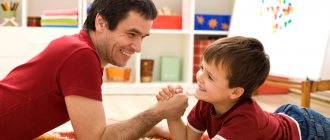Answer: The grandmother has every right to communicate with her grandson. This right is provided for in Art. 67 RF IC. If the baby’s mother prevents communication, you can apply to the guardianship and trusteeship authority or the court to protect your rights.
Divorce in most cases is accompanied by a number of related problems: division of property, collection of alimony, determination of the place of residence of children.
Former spouses are able to resolve some problems peacefully, while others have to be resolved in court. And very often during the proceedings, spouses neglect the most important thing - the interests of the children. And after the divorce of mom and dad, children have the right to communicate not only with the parent who will now live separately, but also with grandparents and other relatives.
Some women do not want to have anything in common with their ex-husband’s relatives and for this reason they protect their child from communicating with them. This mother's position is not entirely correct. Moreover, grandparents can obtain meetings with the baby through the court.
Grandma's rights: what the law says
Rights in relation to children are vested not only in their parents, but also in their grandparents, brothers, sisters and other relatives. This norm is enshrined in Art. 67 RF IC. These persons have the right to communicate with the child and participate in his upbringing. At the same time, parents do not have the right to prevent grandparents from exercising their legal rights.
If the parent does not allow the grandparents to see the baby, then they can simply contact the guardianship and trusteeship authority. And if the parent does not comply with the instructions of the guardianship authority, then his representatives have the right to initiate a judicial procedure to remove obstacles to communication with the child.
Rights of grandparents to communicate with grandchildren
Many families in Russia are going through divorces, which can have a negative impact on children. Often, quarrels, resentments and misunderstandings between parents can cause prohibitions on communication with the child and a war for his attention, from which both the minor and his close relatives suffer.
Expert opinion
Mikhailov Konstantin Kirillovich
Lawyer with 7 years of experience. Specializes in the field of civil law. Legal expert.
In this article we will look at the right of grandparents, brothers, sisters and others to communicate with the child, as well as how to exercise it when parents create obstacles.
Dear readers! Our articles talk about typical ways to resolve legal issues, but each case is unique.
It's fast and free!
Administrative procedure for protecting rights
The procedure for protecting the rights of a grandmother regarding communication with her grandchildren involves contacting the guardianship and trusteeship authorities. If it is not possible to reach a peaceful agreement with the parent, then it makes sense to apply to this organization.
The statement must state the essence of the problem. It is advisable to describe in detail how the parent prevents communication with his grandchildren. Upon application on behalf of the grandmother, the guardianship authorities must conduct an inspection and, based on its results, give a reasoned response.
The guardianship authorities must inform the parent that he is breaking the law. Also, this organization can recommend the parties a procedure for communication and set a schedule for meetings between the grandmother and grandchildren. But still, representatives of the guardianship authorities cannot radically influence the parent. A much more effective way is to go to court.
Violation of the right to communicate
Examples of violations of the right to communicate between relatives and a child may vary. For example, his parents divorced, he stayed to live with his mother, and she forbade his father’s family, i.e.
grandparents, contact with their grandson. Thus, it violates both the minor’s legal opportunity to communicate with relatives and the rights of grandparents to communicate with their grandchildren.
This situation is common, and the motives here can be completely different - from the fact that the mother believes that her ex-husband’s parents are turning their son/daughter against her, to simply anger and resentment. In any case, if relatives suffering from a lack of communication contact the guardianship and trusteeship authorities, the latter will make a decision in favor of the child.
Important! It also happens that a ban on any contact by a parent is quite logical - for example, a father forbids his son/daughter to communicate with their mother because she abuses alcohol, swears in front of the children, and imposes immoral life guidelines on them.
In such a situation, the court will side with the father.
Protecting the right to communicate with a child
Many grandparents are concerned about the question: what to do if their parents do not allow them to communicate with their grandchildren? If the parents (or one of them) of a minor do not allow you to correspond/see/call him/her, and you are a close relative, then you can contact the guardianship and trusteeship authorities.
READ Chairman of SNT: rights and obligations, salary according to the new law 217 as amended in 2021, sample agreement with the chairman
Specialists will review the case and issue an order to determine the procedure for communication with the minor, which will indicate the time, place, and duration of your communication. The parent with whom the minor lives is obliged to comply with this decision.
There are also cases when the mother/father does not obey the decision of the guardianship and trusteeship authorities. If he/she violates the procedure for meetings with close relatives, the latter can go to court (the guardianship and trusteeship authorities can also do this).
In this case, the court, after considering the case, will determine in its decision the order of communication of the minor with relatives.
Judicial procedure for protecting rights
If, despite the recommendations of the guardianship authorities, the parent still continues to prevent the grandmother from communicating with the child, then to finally resolve the situation it is advisable to go to court. On behalf of the grandmother, a statement of claim is filed to establish a procedure for communication with her grandchildren. The initiator of the legal process can also be the guardianship authority.
The claim is filed in the district court, since it is this body that is authorized to consider disputes related to minor children. The application is sent to the place of residence of the parent who violates the legal rights of the grandmother.
The claim must contain the following information:
- Name and address of the court;
- Full name, address of the plaintiff;
- Full name, address of the defendant;
- Name and address of the third party (guardianship authority);
- Circumstances of the case (information about the child, with whom and where he lives, what violations of the plaintiff’s rights are committed by the child’s parent);
- The plaintiff’s demands to establish a procedure for communication (you can specify an acceptable schedule of meetings);
- Applications to the claim;
- Date, signature.
To draw up this statement of claim, the following documents will be required:
- A copy of the plaintiff's passport;
- A copy of the child's birth certificate;
- A copy of documents confirming the relationship with the baby;
- Evidence supporting the plaintiff's arguments.
The plaintiff’s task is to prove that the child needs communication with his grandmother and has an attachment to her.
In addition, if the grandmother is a pensioner, she has enough free time and has the opportunity to pick up the child from kindergarten, school, take her to clubs, etc. This is a significant factor that must be communicated to the court. Most likely, the defendant will object to the plaintiff's claims. Often, a parent argues for his reluctance to give his grandson to his grandmother by saying that she is not raising the child correctly, does not have comfortable living conditions, her health does not allow her to raise the child, and so on. The defendant's arguments must be supported by evidence if they are true. The guardianship and trusteeship authority is involved as a third party in the case. Representatives of the organization give an opinion on the advisability of communication between relatives and the baby.
Does a grandparent have the right to see their grandson after a divorce?
Some lovers' relationships don't work out. Despite the large number of years they have lived together, despite the presence of common children and property, a couple often decides to break off the official marriage. It's just difficult for them to find a common language.
Disagreements may arise while raising children, performing household duties, and providing for the family. Often, after the dissolution of a marriage, former lovers part ways far from peacefully. Even after a divorce, there may be conflicts between the parties regarding the maintenance of common children.
The mother, as a rule, files for divorce, therefore, she applies for alimony. Another pressing issue is not only communication with the father who lives separately from the child, but also communication with grandparents. Often ex-wives oppose this, which greatly spoils family relationships.
The primary role in raising a common child belongs to his parents. This role is not to be challenged in any way. Of course, with the birth of a child, the family expands, therefore, certain individuals become mother and father, and their parents change status to grandparents.
It would seem that the birth of a long-awaited child should be associated only with the most pleasant, warm memories. The very moment of the birth of a new life should bring exclusively positive emotions.
Unfortunately, in most cases this is associated with disputes, scandals, conflicts based on jealousy, division of property, and custody of the child.
According to current legislation, grandparents also have the right to take part in the upbringing of their own grandchildren.
At the same time, mom and dad do not have the right to protect the child from communicating with relatives, and also should not interfere in the relationship between grandmother and granddaughter, grandson. Of course, this is only relevant if the grandmother’s upbringing does not contradict the interests of the child. Communication should not harm a child who has not yet turned eighteen years old.
In no case should education contradict the norms of moral and ethical law. Parents themselves can personally decide, even in a separate agreement (for example, in an agreement on the amount of alimony), whether communication between a grandchild and his grandparents complies with the basic norms of family law. Only the court should deal with this.
At the same time, a family lawyer plays an active role in determining the rights of relatives to raise a child. That is why, if grandparents are not allowed to see their grandchildren and carry out educational work, then they have the right to seek appropriate help from a lawyer or lawyer, and after that - to the court with a claim.
Relatives can independently determine ways to participate in the upbringing of their grandchildren through the courts. When spouses get divorced, very rarely everything goes quietly and calmly, without mutual insults, mutual claims, or division of common property (apartments, houses, cars).
At the same time, everyone forgets about grandparents who cannot see their beloved grandchildren grow up. They also don't have to wait for their kids to come to their home for the summer holidays.
Expert opinion
Mikhailov Konstantin Kirillovich
Lawyer with 7 years of experience. Specializes in the field of civil law. Legal expert.
All grandparents whose grandchildren were taken from them by mothers (sometimes fathers) offended by divorce should know that the law gives them the opportunity to defend their right to communicate with their grandchildren.
The Family Code states that grandparents, great-grandparents and great-grandparents must communicate with their own grandchildren. They can take a direct part in their upbringing. However, parents cannot prevent this or attempt to prohibit seeing their children.
Among other things, if, for example, a daughter-in-law does everything possible to limit the child’s meetings with her husband’s parents, then the latter have the right to go to court. In this case, you can file a lawsuit demanding the removal of all obstacles to the exercise of rights.
According to one of the articles of the RF IC, a dispute about the participation of the ex-spouse’s parents in the life of the child is resolved by the court.
Conclusion
Any family disputes involving minor children are best resolved amicably. For a child’s fragile psyche, parental divorce and misunderstanding between close relatives is a great stress. Therefore, unnecessary proceedings can only do harm.
It is very important to try to find a compromise and agree on how the grandmother and other relatives will communicate with the child if the parents have decided to live separately, without appealing to the guardianship authorities and the courts.
Grandparents and their rights to communicate with their grandchildren
According to practice, in most Russian families unpleasant conflict situations often arise over grandchildren. Some parents prevent their children from communicating with close relatives. This may be due to any quarrels or misunderstandings.
Disputes often arise about establishing ways for grandparents to participate in the upbringing of a minor child. Mothers and fathers can independently determine the place and time of communication between grandparents and grandchildren. In this article you can find out exactly what rights a grandmother has to communicate with her grandchildren are established by current legislation.
- 1 Do grandparents have the right to see their grandson after a divorce?
- 2 How to defend the grandmother’s rights to communicate with her grandchildren? 2.1 Where to contact?
- 2.2 What documents may be required?
READ Article 217 of the Tax Code of the Russian Federation with amendments and comments in the 2021 edition
We recommend: Determining the order of communication (meetings) with the child . Review of judicial practice
- Sample claim: Statement of claim to determine the order of communication (meetings) with a child
- Example of a claim: Statement of claim to determine the order of communication with a child
LIPETSK REGIONAL COURT DETERMINATION
Judge: Antipova E.L. Speaker O.V. Ukolova
Case No. 33-…/2009
..November 2009, the judicial panel for civil cases of the Lipetsk Regional Court, consisting of: presiding Stepanova V.V. , judges Telnykh G.A. and Ukolova O.V., with secretary Nakoryakova S.V. considered in a closed court session the cassation appeal of the defendant Lyubov Nikolaevna Belozerova against the decision of the Oktyabrsky District Court of Lipetsk dated September 22, 2009, which decided:
Satisfy SLA's claims. Determine the following procedure for communication between grandmother SLN and her minor grandson SGV, born July 20, 2004: every first and third Saturday of the month, pick up at 10 o’clock. at his place of residence, L, st. K, d., apt. and on Sunday at 10 a.m. return to the mother’s place of residence, L, boulevard E, apt. .
Having heard the report of Judge O.V. Ukolova, the judicial panel,
installed:
Plaintiff SLA. filed a lawsuit against BLN to remove obstacles to communication with her grandson and determine the order of communication with the child. In support of the stated requirements, she indicated that on September 18, 2006, the marriage between her son SVV was dissolved. and defendant BLN. After the divorce, her grandson SG, born in 2004, began to live with his mother. The defendant prevents meetings with her grandson despite the fact that the child wants to communicate with his grandmother. She asks to determine the procedure for her grandson’s communication with her on Saturdays for the whole day with an overnight stay in her apartment.
During the consideration of the case, plaintiff SLA. clarified the stated requirements, asked to determine the procedure for communicating with the grandson on the first and third Saturday of the month with an overnight stay from 10 o’clock. Saturday until 10 a.m. Sunday.
Defendant BLN., her representative by power of attorney DEN. did not appear at the court hearing, were duly notified of the consideration of the case, and did not notify the court of the reasons for the failure to appear. Earlier at the court hearing, the defendant did not admit the claims, explaining that her ex-husband lives with his mother, the plaintiff SLA, and they have an agreement on the procedure for communicating with her grandson. She pointed out that on those days when the ex-husband takes the child to his home, the grandmother has the opportunity to communicate with her grandson and she does not interfere with this. She also believed that establishing through the court additional time for the child to communicate with his grandmother does not meet the interests of the child. She objected to determining the order of communication on weekends, since on these days the child goes out of town with her parents. She also indicated that her son comes from his grandmother nervous, whiny, and negatively disposed towards his stepfather and other family members.
Representative of the guardianship and trusteeship authority by power of attorney SHEV. supported the claims, pointing out that the grandmother has the right to communicate with her grandson, the grandson wants to communicate with his father’s relatives, and all the necessary conditions for this have been created in their apartment.
The court made a decision, the operative part of which is set out above.
In the cassation appeal, the defendant BLN asks to cancel the court decision as made in violation of the norms of substantive and procedural law, citing that during the consideration of the case by the court, the child’s health condition was not properly established, as well as the fact that before filing a claim in court, the plaintiff I haven’t communicated with my grandson since 2006.
Having discussed the arguments of the cassation appeal, having heard the objections to the complaint of the plaintiff SLA, and having checked the case materials, the judicial panel finds no grounds for canceling the court decision on the following grounds.
According to Art. 67 of the Family Code of the Russian Federation, grandparents, brothers, sisters and other relatives have the right to communicate with the child.
If the parents (one of them) refuse to provide the child’s close relatives with the opportunity to communicate with him, the guardianship and trusteeship authority may oblige the parents (one of them) not to interfere with this communication.
If the parents (one of them) do not obey the decision of the guardianship and trusteeship authority, close relatives of the child or the guardianship and trusteeship authority have the right to file a lawsuit to remove obstacles to communication with the child. The court resolves the dispute based on the interests of the child and taking into account the child’s opinion.
In case of failure to comply with the court decision, measures provided for by civil procedural legislation are applied to the guilty parent.
As was established at the court hearing and confirmed by the case materials, the parents of the minor SGV., born on July 20, 2004, are the plaintiff’s son, SVV. and defendant SLN., SLA. is the child's paternal grandmother; 09/29/2006 marriage between SVV. and SLN. was terminated, which is confirmed by a copy of the divorce certificate; after the divorce, the former spouses live separately, minor G lives together with the mother of BLN..
Satisfying the stated claims and determining the order of communication of the plaintiff SLA. with grandson G, the court correctly proceeded from the fact that, in accordance with the above legal norm, the plaintiff has the right to communicate with her grandson, took into account the conclusion of the guardianship and trusteeship authority on the possibility of communication between a minor child and his grandmother at her place of residence with overnight stays for two Saturdays monthly.
The panel of judges agrees with this conclusion of the court, since at the court hearing the fact that the defendant created a BLN was reliably established. obstacles to the plaintiff’s communication with her grandson according to the schedule proposed by the plaintiff, citing the fact that on weekends the child communicates with other relatives, goes to the village, goes to the pool and to school preparation. At the court hearing, the defendant also explained that after visiting her grandmother, the child comes home aggressive, nervous and tearful, with a negative attitude towards her stepfather and other family members.
As follows from the inspection report submitted to the court about the material and living conditions of the plaintiff’s family, her family lives in a three-room apartment on the street. K, house, apt.. The apartment has been renovated, is clean, comfortable, has all the necessary furniture and household items. A separate room is allocated for grandson G, where there is a bed, TV, audio and video equipment, and toys. Relationships in the family are friendly and respectful; in fact, from birth, the child’s grandmother was involved in his upbringing, the boy is very attached to her. Due to the dissolution of the parents' marriage and their separate place of residence, the child sometimes communicates with his grandmother, she loves to walk with her grandson, gives him gifts and wants to take part in his physical, moral, and mental development.
From the report of the examination of the financial and living conditions of the defendant’s family, it follows that BLN lives with his family, including minor G, in a three-room apartment no. E, d., apt. , conditions for the residence and development of a minor are available. Family relationships are friendly and respectful.
From the conclusion of the department of social and pedagogical support and protection of children's rights of the Department of Education of the Lipetsk City Administration, it follows that in the interests of a minor child it is possible to determine the order of communication between the SLA grandmother. with grandson SG: first and third Saturday of every month at 10 a.m. pick up the child from the grandmother at her place of residence at the address: L, st. K, d., apt. and on Sunday at 10 a.m. return to the mother’s place of residence at the address: L, b. E, d., apt. .
Representative of the department of social and pedagogical support and protection of children's rights of the Department of Education of the Administration of Lipetsk SHEV. supported this conclusion, believes that this order of communication between the grandmother and her grandson meets the interests of the minor child.
The court correctly assessed the evidence presented in the case in its totality and came to the correct conclusion that it was in the interests of the minor SG. The following order of communication should be determined: the first and third Saturday of each month at 10 o'clock. pick up the child from the grandmother at her place of residence at the address: L, st. K, d., apt. and on Sunday at 10 a.m. return to the mother’s place of residence at the address: Lb. E, d., apt. .
The appellant's argument that the child can communicate with his grandmother while he communicates with his father was the subject of consideration by the court of first instance. The court correctly indicated that the child’s communication with his father cannot serve as a basis for dismissing the claim brought by the child’s grandmother. Moreover, it should be taken into account that the order of communication between the son and his father is not established either by the guardianship and trusteeship authority or by a court decision, and is episodic and irregular.
The argument of the complaint that after communicating with the grandmother the child returns home in a depressed psycho-emotional state, negatively disposed against the mother and other close people on the part of the defendant, the judicial panel considers unsubstantiated, because The defendant has not provided any reliable evidence to support this assertion.
The defendant’s assertion that the court did not properly determine the child’s health condition cannot lead to the cancellation of the appealed decision. Thus, from the case materials, it is clear that during the consideration of the case, the court requested information about the state of the child’s health from the Children’s Clinic No. 5, and information about the psychological portrait of the child from the Child Development Center - Children’s Court of Lipetsk No. 23. The requested information was received by the court (case sheets 40, 60 – 62), it was given a proper legal assessment, and, together with other evidence received in the case, it was used as the basis for the court’s decision.
The defendant did not provide any evidence indicating that the plaintiff’s communication with the child in the manner proposed by the plaintiff or recommended by the guardianship and trusteeship authority harms his physical and mental health, as well as his moral development.
The judicial panel takes into account the fact that the right to communicate with the child’s close relatives is an inalienable personal non-property right belonging to each of the relatives by force of law. This right of the child’s relatives is absolute; it corresponds to the obligation of all others, including the other parent(s), not to interfere with the exercise of this right.
Since in this case the right of the grandmother (the plaintiff in the case) to communicate with the child was violated, the court correctly determined the procedure for communication between SLA and grandson G, obliging BLN. do not interfere with this communication.
The court's decision is legal and justified; there are no grounds for its cancellation.
Guided by Art. 361 -367 Code of Civil Procedure of the Russian Federation, judicial panel
determined:
The decision of the Oktyabrsky District Court of Lipetsk dated September 22, 2009 was left unchanged and the cassation appeal of the plaintiff BLN was not satisfied.
How to defend a grandmother’s rights to communicate with her grandchildren?
You can apply to the court; this right is enshrined in Article 67 of the RF IC, which reads:
- all close relatives have the right to take part in raising the child and can also communicate with the child. Nobody can stop them from doing this;
- if mom and dad are categorically against allowing close relatives the opportunity to maintain communication with the child, the guardianship and trusteeship authority may oblige them not to interfere with communication if there are no objective reasons for this;
- If the mother or father of a common child does not obey the decision made by the guardianship and trusteeship authority, then the child’s close relatives and the guardianship and trusteeship authority have the right to file a claim in court. The court usually resolves the dispute based on the interests of the child. He always takes into account his opinion.
Where to contact?
To file a corresponding application, you must go to court.
Why is there no peace or friendship?
The essence of this problem can be expressed literally in a few words: as soon as pride and selfishness are at the forefront, as soon as a person aims to isolate and separate himself from everyone around him, then conflicts begin. Especially with the older generation, grandparents of their children. Why especially? Yes, because, firstly, there is less ceremony with loved ones, and secondly, when living side by side, friction on everyday grounds more often arises, which means there are more reasons for resentment.
Such conflicts often flare up along the female line: between daughter-in-law and mother-in-law, daughter and mother, because a woman is more family-oriented than a man, for whom, despite all his attachment to the family, social status, work, and recognition in society are no less important.
It must be said that in general, conflicts often arise when the usual course of things changes. For example, many problems in relationships between parents and children arise from the fact that children change all the time during their growth and development. Moreover, these changes sometimes occur quickly, downright rapidly. Adults do not always have time to adapt to them. As a result, misunderstanding and tension arise: the establishment of new relationships occurs almost by touch - after all, the traditions that regulated and harmonized the relations of the former patriarchal family are practically lost.
Often the “middle management”, that is, young parents, retain lingering childhood complexes and children’s claims against their parents, especially mothers, since in many families mothers take on a leading function that is inappropriate for them. Then the settling of scores begins, the exaggeration of children's grievances. Moreover, this may not manifest itself directly, but through the grandson, who in such cases becomes a hostage to the hidden struggle. The mother not only raises the child, but does a lot to spite her mother, trying to prove to her that she was wrong. Grandmother, naturally, understands the hidden subtext of such demonstrative upbringing, because close people feel many things without words, and she also becomes offended.
And sometimes the grandmother, trying to prove something, belittles the role of the mother in the eyes of the child. Rivalry arises, which is difficult to overcome if you do not understand the background of what is happening and change your position.










